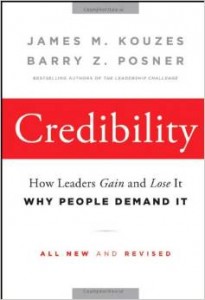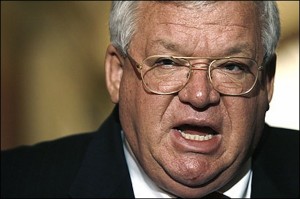Part 2 in a series on professionalism.
Criteria 2: Credible. Has integrity and follows through on what has been promised.
 As a professional, you work hard to establish and maintain a certain level of credibility in the work you do. If you have no credibility, you have nothing at all. Why, then, do people who call themselves “professional” keep ending up in the headlines doing stupid stuff that dismantles their credibility? The answer: They aren’t really professional.
As a professional, you work hard to establish and maintain a certain level of credibility in the work you do. If you have no credibility, you have nothing at all. Why, then, do people who call themselves “professional” keep ending up in the headlines doing stupid stuff that dismantles their credibility? The answer: They aren’t really professional.
On the topic of credibility, I rely on the wisdom of James M. Kouzes and Barry Z. Posner, authors of the book, Credibility: How Leaders Gain and Lose It, Why People Demand It. Kouzes and Posner have conducted longitudinal studies on the topic of leadership for more than 30 years. My dog-eared copy of the book was added to my business library since it first hit the market in 2003. If you haven’t read this seminal book, then visit Kouze & Posner’s website, The Leadership Challenge, and order a copy of the 2011 Second Edition, along with the companion Strengthening Credibility: A Leader’s Workbook.
Kouzes & Posner asked people what specific behaviors they appreciated in leaders they most admired. Four key traits were revealed:
1. Honest
2. Forward looking
3. Competent
4. Inspiring
Combining the three traits of honest, competent and inspiring leads to what Kouze & Posner call source credibility, meaning that people believe you. This is the true essence of credibility. Each of these behaviors reflects an emotional connection. They represent how admired leaders make people feel.
 Speaking of honesty…in the news recently, Rachel Dolezal, (now resigned) president of the NAACP chapter in Spokane, Washington, lost all credibility as her true race, Caucasian, was revealed. She used a few props to portray herself as an African-American woman: An assortment of hairstyles and wigs, adjusting her skin tone to appear “black-ish” as some news commentators quipped, and posing with an older African-American man who she claimed was her father. When asked by an interviewer if she was African-American, she paused and responded, “I don’t understand the question.” What’s not to understand? You either are or you are not. She never admitted the mistake she made, nor did she apologize for lying to and misleading NAACP Spokane chapter members, the national NAACP organization and the general public. Remember, too, that the NAACP, both the Spokane office and the national office, have also lost credibility. Vetting someone takes a few seconds; in the click of a mouse, you can learn just about everything you need to know about that person. The NAACP selection committee would have understood her background better and known she was not qualified as a person of color to lead or represent the organization.
Speaking of honesty…in the news recently, Rachel Dolezal, (now resigned) president of the NAACP chapter in Spokane, Washington, lost all credibility as her true race, Caucasian, was revealed. She used a few props to portray herself as an African-American woman: An assortment of hairstyles and wigs, adjusting her skin tone to appear “black-ish” as some news commentators quipped, and posing with an older African-American man who she claimed was her father. When asked by an interviewer if she was African-American, she paused and responded, “I don’t understand the question.” What’s not to understand? You either are or you are not. She never admitted the mistake she made, nor did she apologize for lying to and misleading NAACP Spokane chapter members, the national NAACP organization and the general public. Remember, too, that the NAACP, both the Spokane office and the national office, have also lost credibility. Vetting someone takes a few seconds; in the click of a mouse, you can learn just about everything you need to know about that person. The NAACP selection committee would have understood her background better and known she was not qualified as a person of color to lead or represent the organization.
In Matt Laur’s interview of Rachel Dolezal on The Today Show, when asked about how differently things might have turned out if she had been more transparent, Dolezal said, “Overall, my life has been one of survival and the decisions that I have made along the way, including my identification, have been to survive and to um, you know, carry on in my journey and life continuum.” It got me thinking about two things: 1. Wouldn’t it have been neat to have Al Roker as the interviewer? I love you, Matt, but… 2. Dolezal’s motives became more apparent to me when she used the word “survival.” Ponder that one.
Back to Kouze and Posner’s book on credibility. In a section entitled “Scandals, Betrayals, and Disillusionment,” they say, “The most common reasons for the decline of credibility are the most visible.” In Dolezal’s case, her own visibility – both physical and professional – is the pivotal reason for the decline of her credibility. The truth simply caught up with her. Had she been transparent from the beginning, about her identification with (rather than her portrayal) as a member of) the African-American race and culture, her future may have looked a little different.
Credibility is one of those intangibles in life that can change from moment to moment. The credibility that you enjoy today has taken years to build. Why risk throwing it all way? Protect your credibility; it is one of your greatest assets. It is built on the foundation of your personal/professional character, and your competence as a professional. Never compromise your credibility.
 When I was in elementary school, excellence was acknowledged with a gold star. When you received two, three or ten gold stars, you knew you were performing consistently well.
When I was in elementary school, excellence was acknowledged with a gold star. When you received two, three or ten gold stars, you knew you were performing consistently well.









